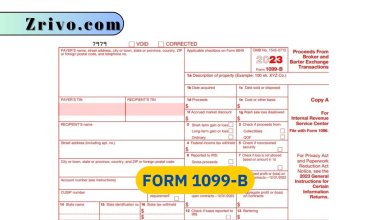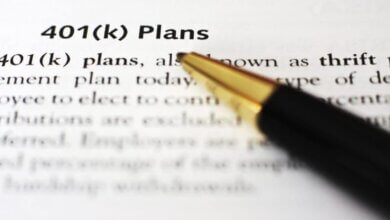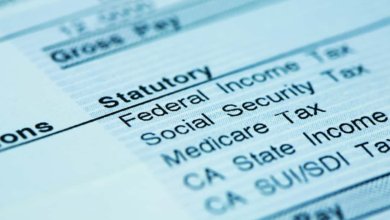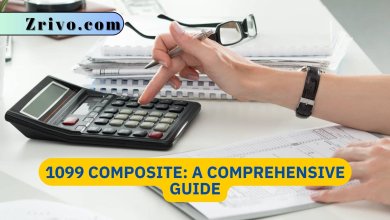1099-C Form 2023 - 2024
Form 1099-C—Cancellation of Debt is the tax form that reports canceled debt which is taxable in most cases. This includes the debt that has been canceled, discharged, or forgiven.

Contents
The IRS sees pretty much any debt that has been lifted off of your shoulders as taxable income. This amount will be added to your gross income at the time of filing a federal income tax return.
In a typical form, the financial institution that canceled your debt will provide information about the following.
- Date of the event
- Amount of debt canceled
- Interest if included in the Box 2
- Description of the debt
- Information about whether or not the debtor was personally liable for the payment of the debt
- Identifiable event code
- Fair market value of the property
As you can see, Form 1099-C won’t state if your canceled debt is taxable or not. You can discuss this with the IRS but generally, most canceled debt is taxable, including student loans. If your repayment plan cancels your debt after a certain period of time, you will pay taxes on the amount forgiven.
How to use Form 1099-C in my federal income tax return?
Add the amount shown on Box 2 of 1099-C to your gross income. If filing a paper tax return, make sure to attach it to your 1040. The amount on Box 2 refers to the total amount of debt discharged. Therefore, no need to add the Box 3 in your gross income as it’s already included.
Tax Implications of the 1099-C Form
The 1099-C form is something that you will be asked to fill out on your tax return. This will let you know if you are eligible for any refunds or will have to pay any taxes. When filling out this form, you will need to ensure that you are entirely accurate about the information you are entering. This will allow you to get the refund that you need.
Canceled debt income is taxable income.
When you have canceled debt, you may wonder if it’s taxable. You can exclude it from your taxable income if it qualifies for an exception. However, you must report it on your tax return. If you don’t, you could have an audit.
The IRS treats canceled debt as taxable, but specific rules apply. You can avoid taxation if it’s forgiven or discharged in bankruptcy. Also, you can qualify for an exception if it’s a qualified farm indebtedness.
If you have a canceled debt, you must report it on your tax return. You will receive Form 1099-C, the lender’s tax form. If your creditor does not send you a 1099-C, you must still report the canceled debt on your tax return. You may have an audit if you do not include the amount of canceled debt on your tax return.
If you have canceled debt, you should consult a tax professional. They can help you calculate your tax bill. This is especially important if you are curious if your canceled debt is taxable. They can also prepare a plan for paying their taxes.
The IRS considers canceled debt to be income if it exceeds $600. If it’s less than $600, you must still report it on your tax return. This means that you could have a large tax bill.
Canceled debt income affects your expected tax refund.
If you have recently taken advantage of debt forgiveness, knowing how you’ll have to report the debt and the tax consequences may be is essential. The IRS expects you to write the income you earned, but this rule has several exceptions.
If you own a home, you can exclude the difference between the amount you paid and the amount the lender agreed to forgive. This is called the qualified purchase price reduction. You also won’t have to report the canceled debt on your tax return if you qualify for a mortgage balance reduction under the Home Affordable Modification Program.
If your canceled debt is under $600, it is not usually required to be reported on your tax return. However, you will need to file Form 1099-C with the IRS. If your canceled debt is over $600, it will be taxable. If you have a sole proprietorship business, you must report your canceled debt on Schedule C.
If you’re planning to apply for debt relief, you’ll want to contact a tax professional to determine how much you’ll owe in taxes. In many cases, you will owe interest charges and penalties. You’ll also have to start saving for your taxes.
Canceled debt income is a tax preparation tool.
Canceled debt is commonly used to describe an amount discharged but not paid back in full. Often referred to as free money, it is crucial to understand its tax implications. When you find yourself in this position, a tax professional can help you calculate your tax bill.
There are various ways to get your tax return regarding the canceled debt included. For instance, if you are a sole proprietorship business, a canceled debt may need to be included on your Schedule C. However, if you are filing as an individual, you do not need to have a canceled debt on your tax return.
The IRS’s publication, Publication 4681, discusses repossessions and bankruptcy. It also includes an insolvency worksheet that compares your assets and liabilities. It is also possible to exclude certain debts from income.
A canceled debt may not be considered taxable income if it meets a few conditions. For instance, a canceled credit card debt discharged in bankruptcy can be excluded from taxation.
In addition, the IRS does not require you to report canceled debt. However, you are expected to do so for the year the debt was canceled. In addition, failure to include a canceled debt on your return can result in an audit.
Can the lender collect money after furnishing me with 1099-C?
No. If the creditor still collects money from you even after issuing the 1099-C, there is a mistake. You should first contact the financial institution that issued your 1099-C and request the collected funds to be refunded to you.
Will canceled debt hurt my credit score?
It depends on the reason for canceled debt. If the debt was canceled due to the debtor being unable to pay it, this will hurt the credit score. If the debt was canceled due to forgiveness or it was discharged not because the debtor can’t pay but it exceeds the maximum time period to repay (e.g. student loans), it won’t have a negative impact on the credit score.
Do I have to pay the canceled debt?
The short answer to this is no. Otherwise, it wouldn’t be canceled debt but it would be freezing the debt. As soon as you receive a 1099-C, the debt amount shown on it is canceled and you won’t pay it back, but will pay taxes.





